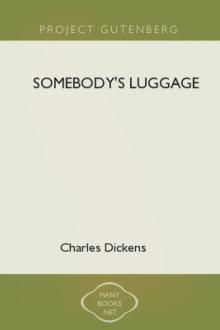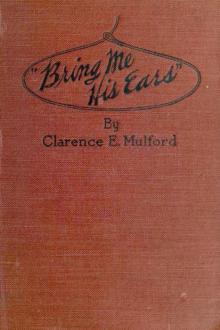Somebody's Luggage, Charles Dickens [good books for 8th graders TXT] 📗

- Author: Charles Dickens
- Performer: -
Book online «Somebody's Luggage, Charles Dickens [good books for 8th graders TXT] 📗». Author Charles Dickens
Such is genius in a commercial country. I am not up to the shivering, I am not up to the liveliness, I am not up to the wanting-employment-in-an-office move; I am only up to originating and executing the work. In consequence of which you never see me; you think you see me when you see somebody else, and that somebody else is a mere Commercial character. The one seen by self and Mr. Click in the Waterloo Road can only write a single word, and that I taught him, and it’s MULTIPLICATION—which you may see him execute upside down, because he can’t do it the natural way. The one seen by self and Henrietta by the Green Park railings can just smear into existence the two ends of a rainbow, with his cuff and a rubber—if very hard put upon making a show—but he could no more come the arch of the rainbow, to save his life, than he could come the moonlight, fish, volcano, shipwreck, mutton, hermit, or any of my most celebrated effects.
To conclude as I began: if there’s a blighted public character going, I am the party. And often as you have seen, do see, and will see, my Works, it’s fifty thousand to one if you’ll ever see me, unless, when the candles are burnt down and the Commercial character is gone, you should happen to notice a neglected young man perseveringly rubbing out the last traces of the pictures, so that nobody can renew the same. That’s me.
It will have been, ere now, perceived that I sold the foregoing writings. From the fact of their being printed in these pages, the inference will, ere now, have been drawn by the reader (may I add, the gentle reader?) that I sold them to One who never yet—{2}
Having parted with the writings on most satisfactory terms,—for, in opening negotiations with the present Journal, was I not placing myself in the hands of One of whom it may be said, in the words of Another, {2,}—resumed my usual functions. But I too soon discovered that peace of mind had fled from a brow which, up to that time, Time had merely took the hair off, leaving an unruffled expanse within.
It were superfluous to veil it,—the brow to which I allude is my own.
Yes, over that brow uneasiness gathered like the sable wing of the fabled bird, as—as no doubt will be easily identified by all right-minded individuals. If not, I am unable, on the spur of the moment, to enter into particulars of him. The reflection that the writings must now inevitably get into print, and that He might yet live and meet with them, sat like the Hag of Night upon my jaded form. The elasticity of my spirits departed. Fruitless was the Bottle, whether Wine or Medicine. I had recourse to both, and the effect of both upon my system was witheringly lowering.
In this state of depression, into which I subsided when I first began to revolve what could I ever say if He—the unknown—was to appear in the Coffee-room and demand reparation, I one forenoon in this last November received a turn that appeared to be given me by the finger of Fate and Conscience, hand in hand. I was alone in the Coffee-room, and had just poked the fire into a blaze, and was standing with my back to it, trying whether heat would penetrate with soothing influence to the Voice within, when a young man in a cap, of an intelligent countenance, though requiring his hair cut, stood before me.
“Mr. Christopher, the Head Waiter?”
“The same.”
The young man shook his hair out of his vision,—which it impeded,— to a packet from his breast, and handing it over to me, said, with his eye (or did I dream?) fixed with a lambent meaning on me, “THE PROOFS.”
Although I smelt my coat-tails singeing at the fire, I had not the power to withdraw them. The young man put the packet in my faltering grasp, and repeated,—let me do him the justice to add, with civility:
“THE PROOFS. A. Y. R.”
With those words he departed.
A. Y. R.? And You Remember. Was that his meaning? At Your Risk. Were the letters short for THAT reminder? Anticipate Your Retribution. Did they stand for THAT warning? Out-dacious Youth Repent? But no; for that, a O was happily wanting, and the vowel here was a A.
I opened the packet, and found that its contents were the foregoing writings printed just as the reader (may I add the discerning reader?) peruses them. In vain was the reassuring whisper,—A.Y.R., All the Year Round,—it could not cancel the Proofs. Too appropriate name. The Proofs of my having sold the Writings.
My wretchedness daily increased. I had not thought of the risk I ran, and the defying publicity I put my head into, until all was done, and all was in print. Give up the money to be off the bargain and prevent the publication, I could not. My family was down in the world, Christmas was coming on, a brother in the hospital and a sister in the rheumatics could not be entirely neglected. And it was not only ins in the family that had told on the resources of one unaided Waitering; outs were not wanting. A brother out of a situation, and another brother out of money to meet an acceptance, and another brother out of his mind, and another brother out at New York (not the same, though it might appear so), had really and truly brought me to a stand till I could turn myself round. I got worse and worse in my meditations, constantly reflecting “The Proofs,” and reflecting that when Christmas drew nearer, and the Proofs were published, there could be no safety from hour to hour but that He might confront me in the Coffee-room, and in the face of day and his country demand his rights.
The impressive and unlooked-for catastrophe towards which I dimly pointed the reader (shall I add, the highly intellectual reader?) in my first remarks now rapidly approaches.
It was November still, but the last echoes of the Guy Foxes had long ceased to reverberate. We was slack,—several joints under our average mark, and wine, of course, proportionate. So slack had we become at last, that Beds Nos. 26, 27, 28, and 31, having took their six o’clock dinners, and dozed over their respective pints, had drove away in their respective Hansoms for their respective Night Mail-trains and left us empty.
I had took the evening paper to No. 6 table,—which is warm and most to be preferred,—and, lost in the all-absorbing topics of the day, had dropped into a slumber. I was recalled to consciousness by the well-known intimation, “Waiter!” and replying, “Sir!” found a gentleman standing at No. 4 table. The reader (shall I add, the observant reader?) will please to notice the locality of the gentleman,—AT NO. 4 TABLE.
He had one of the newfangled uncollapsable bags in his hand (which I am against, for I don’t see why you shouldn’t collapse, while you are about it, as your fathers collapsed before you), and he said:
“I want to dine, waiter. I shall sleep here to-night.”
“Very good, sir. What will you take for dinner, sir?”
“Soup, bit of codfish, oyster sauce, and the joint.”
“Thank you, sir.”
I rang the chambermaid’s bell; and Mrs. Pratchett marched in, according to custom, demurely carrying a lighted flat candle before her, as if she was one of a long public procession, all the other members of which was invisible.
In the meanwhile the gentleman had gone up to the mantelpiece, right in front of the fire, and had laid his forehead against the mantelpiece (which it is a low one, and brought him into the attitude of leap-frog), and had heaved a tremenjous sigh. His hair was long and lightish; and when he laid his forehead against the mantelpiece, his hair all fell in a dusty fluff together over his eyes; and when he now turned round and lifted up his head again, it all fell in a dusty fluff together over his ears. This give him a wild appearance, similar to a blasted heath.
“O! The chambermaid. Ah!” He was turning something in his mind. “To be sure. Yes. I won’t go up-stairs now, if you will take my bag. It will be enough for the present to know my number.—Can you give me 24 B?”
(O Conscience, what a Adder art thou!)
Mrs. Pratchett allotted him the room, and took his bag to it. He then went back before the fire, and fell a biting his nails.
“Waiter!” biting between the words, “give me,” bite, “pen and paper; and in five minutes,” bite, “let me have, if you please,” bite, “a”, bite, “Messenger.”
Unmindful of his waning soup, he wrote and sent off six notes before he touched his dinner. Three were City; three West-End. The City letters were to Cornhill, Ludgate-hill, and Farringdon Street. The West-End letters were to Great Marlborough Street, New Burlington Street, and Piccadilly. Everybody was systematically denied at every one of the six places, and there was not a vestige of any answer. Our light porter whispered to me, when he came back with that report, “All Booksellers.”
But before then he had cleared off his dinner, and his bottle of wine. He now—mark the concurrence with the document formerly given in full!—knocked a plate of biscuits off the table with his agitated elber (but without breakage), and demanded boiling brandy-and-water.
Now fully convinced that it was Himself, I perspired with the utmost freedom. When he became flushed with the heated stimulant referred to, he again demanded pen and paper, and passed the succeeding two hours in producing a manuscript which he put in the fire when completed. He then went up to bed, attended by Mrs. Pratchett. Mrs. Pratchett (who was aware of my emotions) told me, on coming down, that she had noticed his eye rolling into every corner of the passages and staircase, as if in search of his Luggage, and that, looking back as she shut the door of 24 B, she perceived him with his coat already thrown off immersing himself bodily under the bedstead, like a chimley-sweep before the application of machinery.
The next day—I forbear the horrors of that night—was a very foggy day in our part of London, insomuch that it was necessary to light the Coffee-room gas. We was still alone, and no feverish words of mine can do justice to the fitfulness of his appearance as he sat at No. 4 table, increased by there being something wrong with the meter.
Having again ordered his dinner, he went out, and was out for the best part of two hours. Inquiring on his return whether any of the answers had arrived, and receiving an unqualified negative, his instant call was for mulligatawny, the cayenne pepper, and orange brandy.
Feeling that the mortal struggle was now at hand, I also felt that I must be equal to him, and with that view resolved that whatever he took I would take. Behind my partition, but keeping my eye on him over the curtain, I therefore operated on Mulligatawny, Cayenne Pepper, and Orange Brandy. And at a later period of the day, when he again said, “Orange Brandy,” I said so too, in a lower tone, to George, my Second Lieutenant (my First was absent on leave), who acts between me and the bar.
Throughout that awful day he walked about the Coffee-room continually. Often he came close up to my partition, and then





Comments (0)